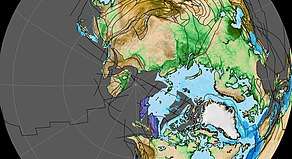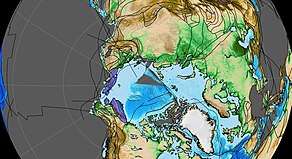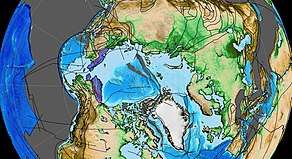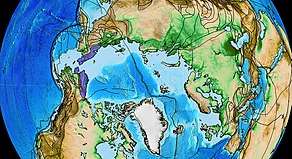Arctic Alaska-Chukotka terrane
The Arctic Alaska-Chukotka terrane (AAC) is a microcontinent that today encompasses the North Slope, Brooks Range, and Seward Peninsula of northern Alaska; the Chukotka Peninsula, New Siberia Islands, and Wrangel Island in eastern Siberia; and the continental shelves of the Bering, Beaufort, and Chukchi seas.[1] Comparable in size to Greenland, the AAC is the largest of the Neoproterozoic–Early Paleozoic continental fragments now dispersed around the Arctic Ocean; some of which possibly formed the continent Arctida.[2]
The AAC originated on the shores of the Iapetus Ocean and is a composite terrane made of fragments from the Baltica, Laurentia, and Siberia continents, as well as the ocean floor of the Panthalassic ocean. The AAC has a complex geological history that includes the Grenville, Timanian, Caledonian–Appalachian, and Ellesmerian orogenies.[1]
The Proterozoic–Carboniferous histories of Arctic Alaska and Chukotka are similar but their Triassic–Jurassic histories are apparently distinct. Whether or not they were separate blocks before the Mesozoic opening of the Amerasia Basin is disputed.[3] The age of the basement of the AAC remains enigmatic, hence also details about the microcontinent's ancient, tectonic history. It is, nevertheless, clear from Neoproterozoic igneous rocks that the AAC was not originally part of Laurentia, but most likely Baltica. The microcontinent was obviously involved in a series of magmatic events, beginning at c. 1.6–1.4 Ga, and ending in the Avalonia–Cadomian orogeny.[4]
References
Notes
- Strauss et al. 2017, Introduction, pp. 649–652
- Till 2016, Arctic Alaska–Chukotka Microplate, p. 220
- Till 2016, Arctic Alaska and Chukotka—One Microplate or Two?, pp. 232–233
- Amato et al. 2014, Abstract
Sources
- Amato, J. M.; Aleinikoff, J. N.; Akinin, V. V.; McClelland, W. C.; Toro, J.; Dumoulin, J. A.; Till, A. B. (2014). "Age, chemistry, and correlations of Neoproterozoic–Devonian igneous rocks of the Arctic Alaska–Chukotka terrane: An overview with new U-Pb ages. Reconstruction of a Late Proterozoic to Devonian Continental Margin Sequence, Northern Alaska, its Paleogeographic Significance, and Contained Base-Metal Sulfide Deposits". Geological Society of America Special Papers. 506: 29–57. doi:10.1130/2014.2506(02).CS1 maint: ref=harv (link)
- Strauss, J. V.; Hoiland, C. W.; Ward, W. P.; Johnson, B. G.; Nelson, L. L.; McClelland, W. C. (2017). "Orogen transplant: Taconic–Caledonian arc magmatism in the central Brooks Range of Alaska" (PDF). GSA Bulletin. 129 (5–6): 649–676. doi:10.1130/b31593.1. Retrieved 19 July 2018.CS1 maint: ref=harv (link)
- Till, A. B. (2016). "A synthesis of Jurassic and Early Cretaceous crustal evolution along the southern margin of the Arctic Alaska–Chukotka microplate and implications for defining tectonic boundaries active during opening of Arctic Ocean basins". Lithosphere. 8 (3): 219–237. doi:10.1130/L471.1.CS1 maint: ref=harv (link)



